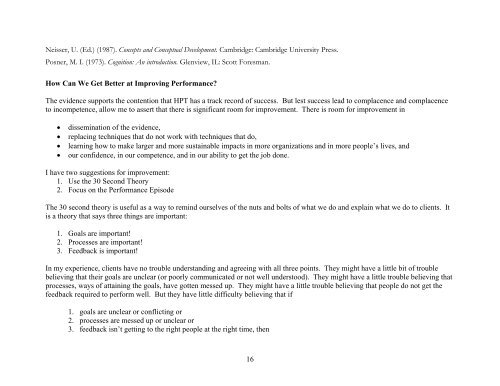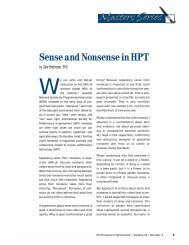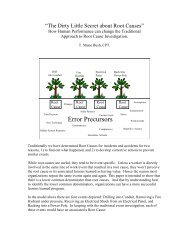Yes We Can! - International Society for Performance Improvement
Yes We Can! - International Society for Performance Improvement
Yes We Can! - International Society for Performance Improvement
Create successful ePaper yourself
Turn your PDF publications into a flip-book with our unique Google optimized e-Paper software.
Neisser, U. (Ed.) (1987). Concepts and Conceptual Development. Cambridge: Cambridge University Press.<br />
Posner, M. I. (1973). Cognition: An introduction. Glenview, IL: Scott Foresman.<br />
How <strong>Can</strong> <strong>We</strong> Get Better at Improving Per<strong>for</strong>mance?<br />
The evidence supports the contention that HPT has a track record of success. But lest success lead to complacence and complacence<br />
to incompetence, allow me to assert that there is significant room <strong>for</strong> improvement. There is room <strong>for</strong> improvement in<br />
• dissemination of the evidence,<br />
• replacing techniques that do not work with techniques that do,<br />
• learning how to make larger and more sustainable impacts in more organizations and in more people’s lives, and<br />
• our confidence, in our competence, and in our ability to get the job done.<br />
I have two suggestions <strong>for</strong> improvement:<br />
1. Use the 30 Second Theory<br />
2. Focus on the Per<strong>for</strong>mance Episode<br />
The 30 second theory is useful as a way to remind ourselves of the nuts and bolts of what we do and explain what we do to clients. It<br />
is a theory that says three things are important:<br />
1. Goals are important!<br />
2. Processes are important!<br />
3. Feedback is important!<br />
In my experience, clients have no trouble understanding and agreeing with all three points. They might have a little bit of trouble<br />
believing that their goals are unclear (or poorly communicated or not well understood). They might have a little trouble believing that<br />
processes, ways of attaining the goals, have gotten messed up. They might have a little trouble believing that people do not get the<br />
feedback required to per<strong>for</strong>m well. But they have little difficulty believing that if<br />
1. goals are unclear or conflicting or<br />
2. processes are messed up or unclear or<br />
3. feedback isn’t getting to the right people at the right time, then<br />
16

















